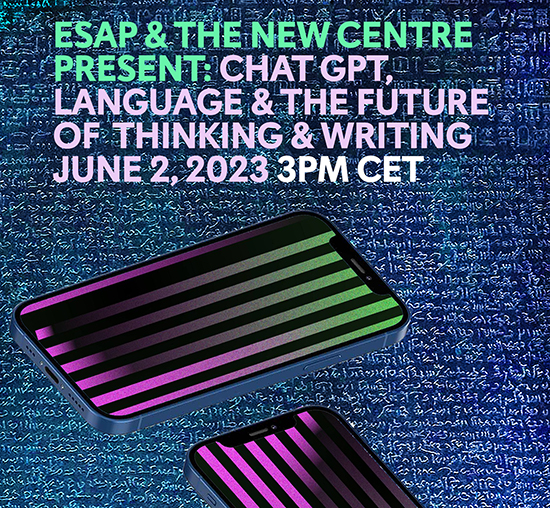&

Together with ESAP (Escola Superior de Arte do Porto), we hosted a roundtable titled "ChatGPT, Language and The Future of Thinking & Writing" on June 2nd, from 16:00-18:00 CET. You can watch it through this link.
ChatGPT and other developments in Large Language Models have taken the world by storm. Their profound and yet unformulated implications for thinking, reasoning and writing have sparked crucial debates on the transformation of human intellect and communication in our age. This roundtable explores the complex relationship between ChatGPT's emergence and the changes already underway in thinking and writing practices. This roundtable brings together: Elie Ayache, Joao Enxuto & Erica Love, AA Cavia, Joao Oliveira Duarte, Anna Longo, Rafael Moscardi, Reza Negatestani, Mohammad Salemy, and is Moderated by Romulo Moraes.
Featuring human-like text generation and comprehension capabilities, ChatGPT has found applications in a myriad of industries, from content creation to customer service. It also sparked a number of controversies for its usage on academic tasks such as writing, editing, and summarizing as well as uses in creative writing. As much as AI models have been instrumental in augmenting human intellect, they have also inherited the limitations and biases of the data they have been trained on. With that in mind, this roundtable asks: What are the limitations it reproduces? Are we on the brink of a new revolution in intellectual labor? What does ChatGPT say about our own capacity for reasoning in our predicament?
Below, you can find the abstracts from our participants:
Elie Ayache: ChatGPT cannot write, it can only predict text probabilistically and you know what I think of probability and prediction as opposed to writing. Definitely, some arguments from derivatives writing and trading should be brought to bear. Especially in relation with the future, whose awareness seems to be the necessary condition from AI to be capable of thought.
AA Cavia: AI as a research project has as its founding myth the notion that mimicry and intelligence are indistinguishable. What modes of artificial reason lie beyond the imitation game? I will argue for the centrality of the notion of a 'world model' in accounts of sapience.
João Oliveira Duarte: Our aim will be to address ChatGPT as a bodiless language from above as a particular example of Borges’s library: a place in which sense and nonsense, gibberish and meaningful sense, cannot be distinguished.
Joao Enxuto & Erica Love: We will discuss the uses and effects of deploying descriptors such as “dreaming” and “hallucinating” to generative AI and how these allusions to transcendental states confer (humanistic) artistic agency to computational processes.
Anna Longo: Based on statistical methods, chat GPT confirms opinions, perspectives, and knowledge that we have already rather than improving and differentiating them. Entailed by the strategy of the current industry for information production and consumption, it favorises the latter while reducing the space for actual "creativity" and dissent.
Rafael Moscardi: From the Jacquard Loom to the thermodynamic engine, from the computer to the database and now with ChatGPT and other LLMs, paradigmatic “machines” bring the demystification of a task and change the form and function of labor as such. Can we forecast where these developments are heading after the release of ChatGPT?
Reza Negarestani: ChatGPT is a logical continuation but also an exacerbation of the so-called arsenals of democracy. The focus will be on how ChatGPT can be seen via the emerging doctrine of weapon open system architectures where potentials for weaponization are developed in accordance with adversarial dynamics and threats which do not yet exist.
Mohammad Salemy: ChatGPT did not change the nature of thinking and writing, thinking and writing had already changed and this is precisely why ChatGPT emerged.
To see The New Centre Refund Policy CLICK HERE.